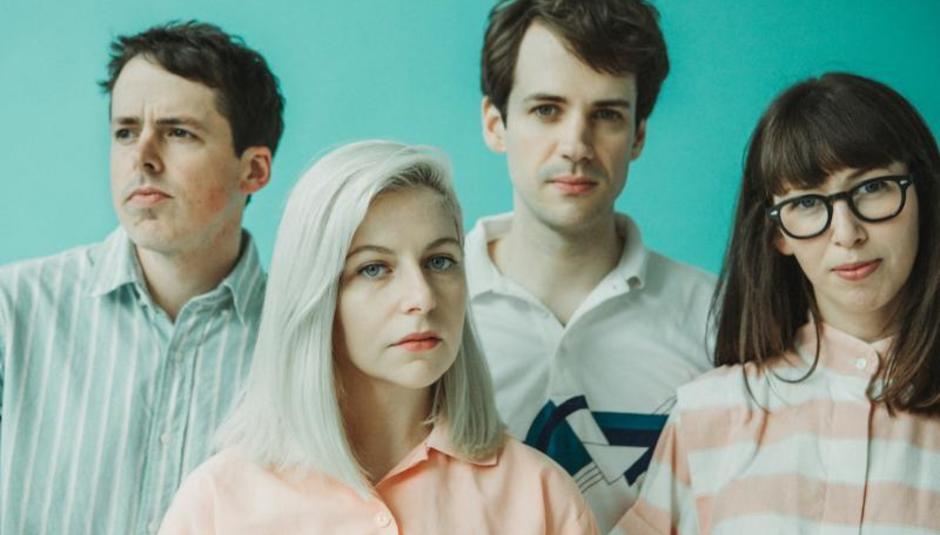We've had a soft spot for Alvvays at Drowned In Sound ever since first single 'Archie, Marry Me' landed in April 2014. Their self-titled debut long player followed three months later and became a firm favourite culminating in its lofty placement in many End Of Year Best Of's.
This month sees the band release long awaited follow-up Antisocialites, and even though they've been away for the past eighteen months making the record, their sold out UK tour over the first week of September suggests they're as popular a draw as ever.
DiS caught up with main songwriters Molly Rankin (vocals, guitar) and Alec O'Hanley (guitar, keyboards) prior to their show at Nottingham's Rescue Rooms earlier this month.
How's the tour been so far?
Molly Rankin: We had a lot of fun at End Of The Road.
Alec O'Hanley: That's one of the good ones. The line up this year was just wild.
MR: Birmingham was cool too. The audience were quite a celebratory bunch.
AO: They've all been pretty solid. Glasgow, in particular, was fun. We got to meet some local legends. Stephen Pastel was there and we went to Mono afterwards and met Tracy-Anne Campbell. Norman Blake was there too. He lives pretty close to us in Toronto. His wife's from Kitchener-Waterloo so he moved over there. It's very romantic to move from Glasgow to peripheral Ontario for love. He played on our new record so it was great to see him at the show.
With the first record doing so well over here and the September tour having sold out everywhere, do you see the UK as being like a second home for the band?
AO: We're certainly grateful that we broke here first and in having done so that was part of the rationale for coming back here first. It's been reliably enthusiastic in the UK for us. Britain took a chance on us when not many others had at that point.
MR: They seem to know most of the words to a lot of the new songs that aren't even out yet which is great.
AO: It has a great music culture over here. They're the most likely audiences to dive into melodies and words which are the core of what we do. I just hope things resonate with them the way they have with us.
Have the new songs been well received so far?
AO: There's nothing like familiarity to really get a crowd behind something yet in spite of that we still get roaring reactions to songs you wouldn't expect us to like 'Forget About Life', the last song on the new record.
MR: We've been overwhelmed at the way people have been reacting to that song as it's in stark contrast to the majority of the pop songs we play.
AO: It can be quite cathartic. I hope it brings home how immediate some of our songs can be. We toy with restraint so it's encouraging when people feel the same wave of triumph that we're on.
Was there a weight of expectation around Antisocialites bearing in mind how well the first record did?
MR: We had the same stress making the first record. A lot of sonic struggles. Whereas with this one we went into it knowing a little bit more. Writing for it was looming over me as we continued touring. People were asking me what the new record sounded like and I hadn't really finished it at that point. That was the only stressful part different from the previous record. Other than that we didn't really let anything else affect us. That people are excited to hear the new songs should be exciting for us too.
Some of the songs on Antisocialites date back to the first record, 'Your Type' being one that featured in the setlists when you first came to the UK three years ago. When did the writing process begin to take shape for this album?
AO: 'Your Type' was the first song we had ready for this record. 'Saved By A Waif' followed soon after. We played that a few times the last time we were over here as well. We're not averse to road testing a new song. It was a gradual process. We're not the biggest road writers. I don't know how Lennon and McCartney wrote Revolver on the road. I guess it was a different era. There are a few songs we wrote that got tossed to the side.
'Your Type' has changed an awful lot from the fast and frantic live version I first heard back in 2014 to the more melodic one that features on the new record.
AO: It's still 200 bpm. We wanted it to be more like The Primitives.
MR: I think in slowing it down it actually became slightly heavier. I feel the weight of the words are a little clearer.
AO: Also, it gives the drums time to resonate. But it's still the fastest song we play.
It's interesting you mention The Primitives as you covered their 1988 single 'Out Of Reach' regularly during the encore last time you were over. Will you be playing that again this time around or any other covers for that matter?
AO: Yeah we specifically picked another English cover by The Motorcycle Boy who were a side project of Alex from The Shop Assistants called 'Trying To Be Kind'. It's a really fun number to do. Some of those songs feel like they never got their proper due at the time. I don't know if they were bigger on this side of the Atlantic or not? When we were writing the new record I found this book in a library in Toronto which listed UK chart hits from 1980 to 1989 and I became obsessed with it. I found so many Felt records which I'd never previously encountered or that Norman Blake was in a band called The Boy Hairdressers before Teenage Fanclub either. We played their single and it was the most incredible pseudo-Celtic, Gaelic thing. Bands like Kleenex and Liliput too. It was such a cool era for bands and for whatever reason we've gravitated towards that 80s revivalism of the 60s.
How many songs were written and of the ones that didn't make Antisocialites, will they be revisited in the future?
AO: There were probably around 30, maybe 35 in the mix. Some of those were ideas that became fully fledged songs. Others didn't quite make it. If we're counting demos as well then it would probably be in the hundreds.
MR: I've got a lot of the demos on my phone. I listen back to them every now and then thinking they will be good one day!
AO: Some of the demos made it onto the record. The first sound you hear on the album is us fooling around in our back room in Toronto. We tried to recreate it initially but once it became obvious the best recording was on the original demo we decided to use that instead.
How long did it take to complete the album?
AO: We started recording the album in LA early last fall. September I believe. Then when we got back from LA we realised there was a lot more work to do to raise the songs to the standard we wanted. So we set about learning how to record, engineer and re-amp. Cue and mix and various other things.
MR: We went through a few different mixes in the end. Some came out well. Some didn't.
AO: Then it kind of fell back into our laps and we ended up mixing around two-thirds of the record ourselves. It was an educational experience with a little bit of pressure, but everything seemed to pan out.
MR: Sometimes it's fun when someone says you can't turn that up. And you just want to so you end up doing the exact opposite!
AO: We had some fun in a studio in New York when we turned up the guitars and completely blew out the board! The amp was totally wrong from a technical perspective, but it's those kind of happy accidents that you really want to cling to.
Did the album's tracklisting change at any point while you were making Antisocialites?
MR* Sometimes it's hard to nab the documentation of a song. I felt the older ones suffered from that. Early on, we were set in our ways about how the songs sounded. When we got into the studio it was like we almost had to go back to the start and wipe whatever plan we had off of the board and try new things.
AO: If you've got a few documents of a song already you kinda have that history to contend with a little bit. It's the songs in their infancy that are the most malleable. So they have a tendency to come together quite quickly. We have tried to bolster our recording and engineering chops so if we do get lucky the first time while we're still writing a song and it's revealing itself to us we therefore have a workable commercial grade document that we could potentially release.
If you had the benefit of hindsight is there anything you'd change or do differently with the album?
AO: We always ponder things. We had that after the first record a little bit; I wish I'd done this or that but at the end of the day you can't. I guess it's the same with a painting. Having some kind of artistic regret. But that's not a game we play at all. We try to create a document to the purest version of the song and that may mean it's quite raw sounding at the end of it. In terms of revisionist pining, we're very happy with anything we put out and we don't put out anything that we're not prepared to live with and play for years and years to come. They're our babies.
Has the way you write or approach writing songs changed over the past couple of years since the first record?
MR: I think Alec's become a little bit more diligent about documenting writing. Treating it like a scheduled thing. He's a little bit more disciplined I guess. I can be at times too it's just I'm usually waiting for the lightning to strike.
AO* We have two different styles of writing. Molly likes to escape and retreat. I used to think there was a great amount of mystique in writing and you could only write once you were inspired. Now I realise when it composition and demoing you have to place yourself in a position to be inspired. There's no shame in treating it like what it is which is work. It doesn't make it any less sacred or sacrosanct.
MR: It's what fulfills you and work is generally the most fulfilling. It gives you purpose. For me anyway. I don't feel any more empowered.
AO: It's the best feeling when you have a breakthrough of some sort.
I remember you all having day jobs back home in Toronto when we last spoke in 2015. Is that still the case?
AO: Yeah, we all still have other jobs too. I guess we all have forgiving bosses with the exception of Molly who is her own boss! I still work in the guitar shop Paul's Boutique when I'm back home. You do sacrifice your routine. We turned our lives into groundhog day so that people we play for don't have such groundhog day-esque lives. We've put ourselves on the line a little bit.
MR: Music is valuable. It's enriching. I'm not exactly sure what will happen with music whether artists or companies will figure out how to ensure musicians can make a living? Yet it's something so many people benefit from.
Do you think there's more gender equality in music now than there was say 5-10 years ago?
AO: I think so. The 1990s and early 2000s were definitely much more of a male-centric time for bands.
MR: I think so which is why it's disappointing to see the lack of females on bills at certain festivals. And not only that, but also the types of bands too.
What are your plans for the rest of this year?
AO: We finish in the UK later this week then we head off into the continent. We have a week off in Toronto to fold t-shirts before we head out around the United States then we're touring Canada straight after that. There'll probably some shows in Japan before the year's out as well.
Has your success inspired other bands back home? Is there much of a scene in Toronto?
AO: We haven't encountered many imitators. Maybe that's because we ourselves are so referential. We certainly feel a kinship with a few people back home like the first band we ever took on tour with us in the US, Absolutely Free. They're recording at the minute with George Albrecht who recorded a few B-sides for us and who we may record with again. He's collaborated with Ariel Pink on a few records. Kerri's (MacLellan, keyboards) boyfriend's band Kiwi Jr who our bassist Brian (Murphy) also plays guitar with are another. It seems like we haven't ruffled too many feathers in Toronto; they put us in the local paper there last Saturday. We'll wave the Toronto flag any day of the week - it's a really reasonable, safe and inspiring city.
Are there any other new bands who've caught your attention while you've been touring?
AO: Spinning Coin are great. I can't wait for their record to come out.
MR: Omni are great too. They should be touring soon.
AO: Frankie Broyles who used to play guitar in Deerhunter plays with them. They have a new record coming out soon as well. There are a few bands we've played with we really love like Jay Som for instance. They're on Polyvinyl too and their record is one of our favourites this year. Nap Eyes who are from our part of the world as well. They seem pretty anglophilic. We love the new Ariel Pink record as well.
Has the current political climate influenced your writing in any way? Do you think more bands have become politicized in light of Trump's inauguration and rise of right wing politics worldwide?
AO: The one silver lining of this era is it's now acceptable for bands to discuss politics which used to be taboo. But now, the person who you knew as being the most apolitical traditionally will be talking about it and that can only be a good thing. We're not the soapbox type but that doesn't mean we don't have strong convictions. We love freedom as much as the next person. I wish we'd finished the record before November 8th last year for sure. It would have been a little easier to focus. This swirling chaos, you either try to block it out or inevitably some of it seeps into our narratives. It's not a particularly nice era.
MR: Sometimes it's good to just write love songs. I don't know how far my soapbox would resonate with people. People who are less fortunate or more marginalised than you are need to have the microphone passed to them. Give them a platform rather than listen to me yelling about everything that's wrong with the world.
What advice would you give to a new band just starting out?
MR: Never pay someone to do something you can do just as well yourself. If you can make your own show poster, do it. T-shirts and merchandise, just little things like that. Utilize everything you have. There's a lot of jargon people like to use to leverage themselves as being important in this industry. As soon as you start seeing through that it can be a bit of an eye opener.
AO: When we find someone who can do something better than we ourselves can we'll work with that person. We are intensely involved with every aspect of this band. In some cases more than we'd particularly like to be. But then if you're not doing it yourself it's probably not worth doing in the first place. Your work and collective responsibilities end up being more cohesive if you tackle them yourselves. If you don't know what to do, find a band you like who have done it well.
Antisocialites is out now via Polyvinyl Record Co. For more information about the band, please visit their official website.






















